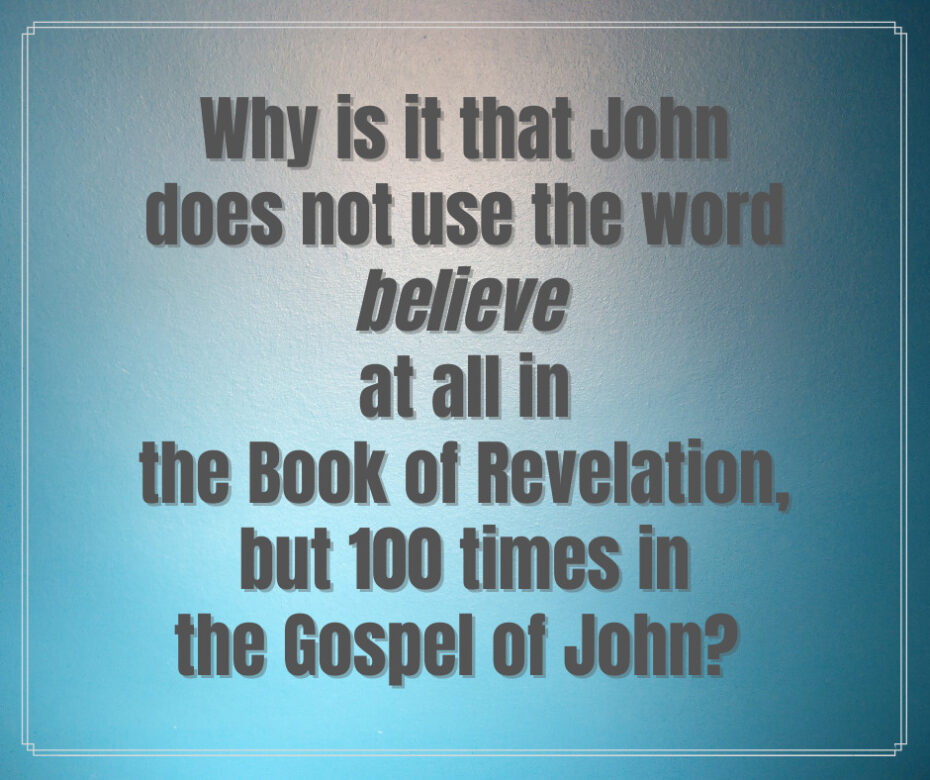Derek asks a very good question:
I very much enjoy GES and all of the assurance I’ve found through your writings. I have a question. I’m reading through Revelation and J. Vernon McGee’s commentary. He, as well as others, talks about “Tribulation saints,” people who will turn to Christ during the tribulation.
However, in 9:18 a third of mankind is killed and in verses 20-21 John says that everyone who was not killed by the three plagues still didn’t repent. In fact, John never mentions anyone repenting. It seems odd to me that he wouldn’t mention that an innumerable number of people did repent. I know verse 7:9 talks about those who came through the Tribulation, but it sounds like they were just Christians who suffered through the Tribulation (like maybe they weren’t raptured before it). Can you please explain this to me?
It is very perceptive of Derek to notice the teaching on repentance in Revelation. Two passages talk about terrible judgments falling and then indicate that the people did not repent of their evil deeds: Rev 9:20-21 and Rev 16:9-11.
What is the point of these two texts?
I suggest that the point is that the reason why these terrible judgments continue unabated is because the nations do not repent of their wickedness. Repentance is the condition for individuals and even nations (e.g., Nineveh and the prophet Jonah) being delivered from temporal judgment.
Repentance is not a condition of everlasting life or justification. The sole condition of the new birth is faith in Christ as John 3:16 and a hundred other NT verses make clear. In fact, repentance is not even found in John’s Gospel.
But repentance is found a dozen times in John’s fifth book, Revelation. In Revelation 2-3 John calls upon believers who are out of fellowship with God to repent. In the text Derek cites, Rev 9:20-21, as well as Rev 16:9-11, John reports that the nations will not repent and hence the judgments will proceed.
Derek wonders if unfaithful Christians have to suffer through the Tribulation. While that is a view some hold, it is contradicted by 1 Thess 4:13-18 and 1 Thess 5:9-10. All church age believers will be raptured, even those who are morally asleep at the time of the rapture. Revelation 7:9 is discussing overcoming believers, those “clothed with white robes.” Compare Rev 3:4-5. White robes are a reward for faithful believers. This great multitude could be Tribulation martyrs. But the text does not say that these were OT saints, church age saints, or Tribulation saints. All three might be in view. But only overcoming believers are in view.
A final question Derek has is quite interesting. What proof is there in the Book of Revelation that there will be believers then?
First proof: the seven letters to the seven churches. The Lord is not writing to buildings here. He is writing to seven groups of church age believers (or more if each city had multiple house churches). The Lord refers to the faith of the readers in Rev 2:13, 19. He calls on the readers to be watchful in light of the Lord returning as a thief in the night (Rev 3:1-3), an appeal Paul makes to believers in 1 Thess 5:1-11. Compare also Matt 24:40-44.
Second proof: the two witnesses. There are two men who in the first half of the Tribulation do many miracles and prophesy in the name of Jesus (Rev 11:3). While they are never called believers, it is clear that they are.
Third proof: the 144,000 Jewish evangelists. Revelation 7:4-8 refers to 144,000 who are sealed and who are called “servants of our God.” There are 12,000 from each tribe. Only believers are sealed and are called servants of God.
While we are never specifically told what these servants of God do, most believe that they will travel the world and evangelize unbelievers. Some have suggested that they will lead untold millions to faith in Christ. This might be the greatest time of revival in the history of mankind. Even though there will be widespread unbelief and wickedness, that does not mean that few will be born again during these seven years.
I do acknowledge, however, that there are no uses of the word believe in Revelation—a stark contrast with 100 uses of that same word in John’s Gospel. And there are only four uses of the word faith (pistis) in Revelation (2:13, 19; 13:10; 14:12). Why? I’d say it is a matter of purpose. John’s Gospel is written to unbelievers to lead them to faith in Christ for everlasting life (John 20:30-31). The Book of Revelation is written to church age believers to call us to holiness in light of the Lord’s soon return.
Interestingly, the most popular word in Revelation for believers is the word Derek mentions, saints. The word saints (hagioi) occurs 13 times in Revelation (5:8; 8:3, 4; 11:18; 13:7, 10; 14:12; 15:3; 16:6; 17:6; 18:24; 19:8; 20:9). The word saints means set apart ones. That is, it refers to those who have been placed into God’s family forever. This is called past sanctification. Once anyone believes in Christ, he is set apart once and for all.
When my sister was a fairly new believer, she heard the expression, either you are a saint, or you’re an ain’t. She got a kick out of that. I did then and I still do find that a great expression. The unbeliever lacks everlasting life. The believer/saint does not.


